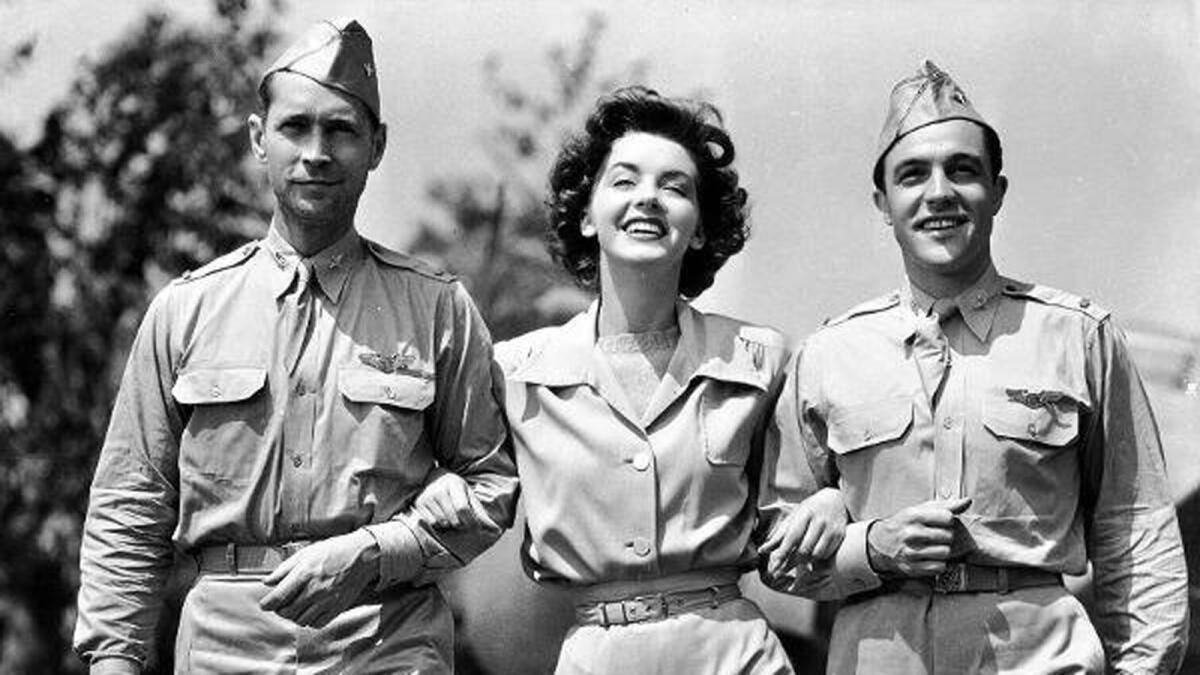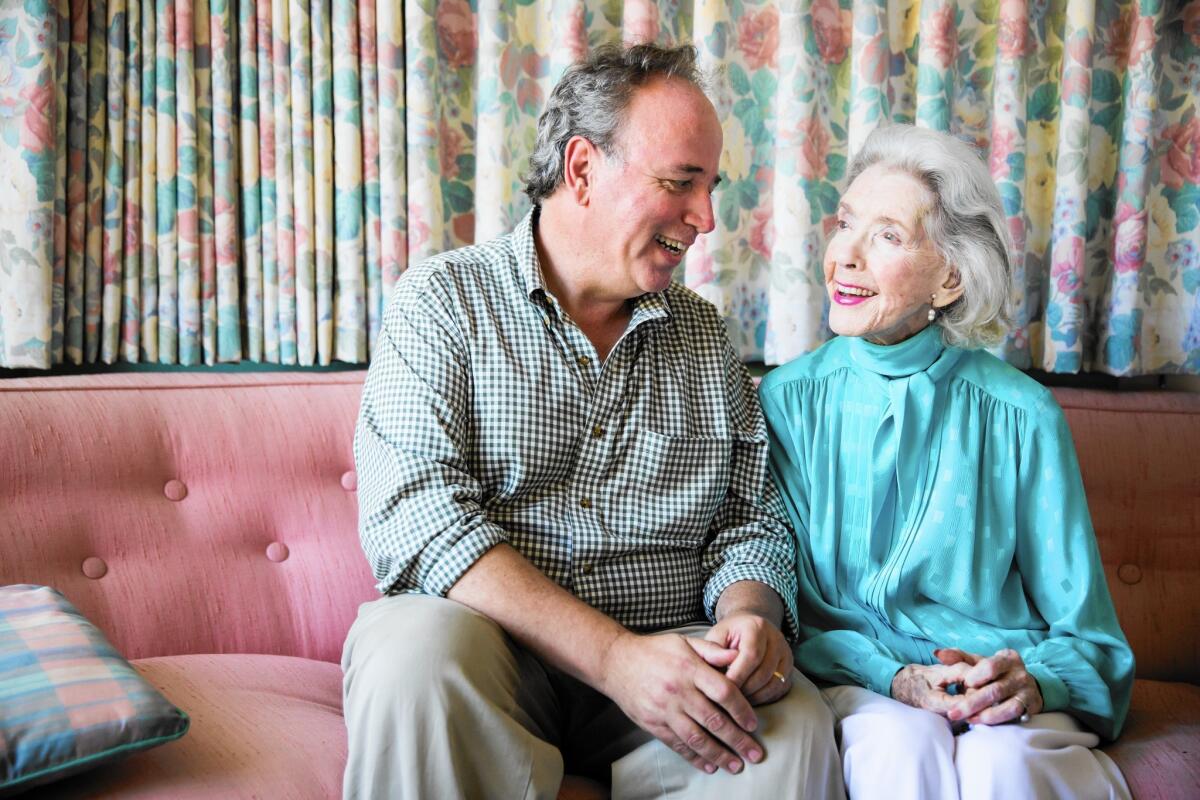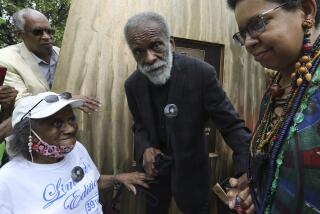Marsha Hunt, prolific Hollywood actor who was blacklisted, dies at 104

- Share via
By the time she was in her early 30s, Marsha Hunt — tall, elegant and well-spoken — had acted in 52 movies, posed on the cover of Life magazine, and been asked by each of the three major TV networks to host her own show.
But in 1950, the accomplished, attractive Hunt suddenly fell out of favor.
“I was waiting to hear from the three networks, and I never did,” she recalled in a 2010 interview with NPR. “And my agent explained this with two words, which I had never heard before: ‘Red Channels.’ ”
Hunt, who was listed along with 150 other Hollywood personalities in an anti-communist publication that derailed her career, died Wednesday of natural causes at her home in Los Angeles, according to Roger C. Memos, director of a 2015 documentary about the actor. Hunt was 104.
Hunt’s film work also dried up during the Red scare. Over the remaining decades of her career, she was cast in only a dozen more movies, mostly in minor roles.
“I was never subpoenaed. I was never a communist. I was never a figure of public controversy,” Hunt told an interviewer. “I just stopped working.”
When Hunt was most in demand, she was a character actor in movies that included “Pride and Prejudice” (1940), “Blossoms in the Dust” (1941) and “The Human Comedy” (1943).
“I played four old ladies before I was 30, a Brooklyn showgirl, society snob, schoolteacher, unmarried mother, Army nurse, two nightclub singers, crime lab technician, spoiled heiress, symphony harpist, farm girl and two suicides, among others,” she told film historian Anthony Slide in his 1999 book, “Actors on Red Alert.”
Joining the board of the Screen Actors Guild in 1946, Hunt, who had never been politically active, soon riled conservative board members. When a set decorators’ strike disrupted Warner Brothers, she urged them to quit speculating about alleged communist agitators and focus instead on the workers’ grievances.
“As I spoke, I could see elbows nudging, glances exchanged, as if to say, ‘She must be one!’,” she said in an interview published in “Tender Comrades: A Backstory of the Hollywood Blacklist” (1997).
When the House Un-American Activities Committee held hearings in 1947 on the political activities of 19 screenwriters and directors, Hunt was among the Hollywood celebrities who chartered a plane and flew to Washington in protest.
When they returned, some of the stars, including Humphrey Bogart and Lauren Bacall, backpedaled, calling their involvement ill-advised.
But Hunt and her husband, screenwriter Robert Presnell Jr., offered no such apologies.
In June 1950, “Red Channels” denounced 68 actors, 44 writers, 28 musicians, 18 directors, 11 commentators, three announcers, a music critic, a lawyer and an accountant for their alleged communist leanings. They included such celebrated figures as Pete Seeger, Dorothy Parker, Edward G. Robinson, Orson Welles, Edward R. Murrow, Lena Horne and Arthur Miller.
Hunt was listed between writer Langston Hughes and director Leo Hurwitz. She was cited for six allegedly unpatriotic actions, including giving an anti-censorship speech and signing a petition asking that the Supreme Court decide whether noted screenplay writers Dalton Trumbo and John Howard Lawson were rightly convicted of contempt for refusing to tell HUAC whether they were communists.
“And yes indeed, I had been there, I had done that, I had said this or signed something, all of them things I believed in and was amazed to discover they were considered subversive in some way,” Hunt told NPR.
The ‘’Red Channels” list was one of several that named people in the entertainment industry. Many of those listed found little work for years afterward.

Born in Chicago on Oct. 17, 1917, Marcia Virginia Hunt was the daughter of Earl Hunt, a lawyer and insurance executive, and Minabel Hunt, a voice teacher and organist. She was raised in New York City and attended private schools.
As a teenager, she took drama classes and became a model. Anticipating an acting career, she vowed to spell her first name so her fans would know how to pronounce it. Hence: Marsha.
When she was 17, a couple of publicists planted an item in the Los Angeles Times about “a New York artist’s model” coming to town to visit her uncle.
“I’m here purely on a vacation trip,” she told The Times in 1935. “I have no ambition to enter the films at the present time.”
The story had its desired effect. Studios sought out the unknown Hunt for screen tests. Later that year she appeared in “The Virginia Judge,” the first of 12 films for Paramount.
She was a co-ed in “College Holiday” (1936), with George Burns, Gracie Allen and Jack Benny. In the 1939 comedy “Joe and Ethel Turp Call on the President,” Hunt, then 22, modeled an elderly character after her family’s housekeeper and a great-aunt in Indiana.
“I was fascinated with older women’s carriage, the way they sat, the way they worked their mouths, the way they squinted through their glasses,” she told an interviewer when she was in her 80s.
Hunt worked alongside John Wayne, Laurence Olivier, Lana Turner, Greer Garson and other major stars.
After her mention in “Red Channels,” she appeared with Charles Boyer and Louis Jourdan in “The Happy Time” (1952). During filming, she later recalled, she was pressured to sign a full-page ad declaring her opposition to communism.
She refused.
While Hunt’s film roles grew sparse, live theater was relatively unaffected by the blacklists. Hunt starred in six Broadway plays and as many as 30 regional productions.
Her last major role was in “Johnny Got His Gun,” a 1971 antiwar film based on a book by Trumbo, the once-ostracized screenwriter. Trumbo, who wrote the scripts for “Exodus” and “Spartacus,” among others, also directed it.
Over the years, Hunt became an activist, working on refugee causes for the United Nations, helping organizations for the homeless in Los Angeles and becoming an early supporter of same-sex marriage. In the early 1980s, she was named honorary mayor of Sherman Oaks.
Film buffs honored her at festivals, singling out movies such as the noir crime story “Kid Glove Killer” (1942) and the early Holocaust indictment “None Shall Escape” (1944). Her career was captured in Memos’ documentary, “Marsha Hunt’s Sweet Adversity.”
At every appearance and in every interview, she was asked about her offscreen role in “Red Channels.”
“The only real regret I have,” she told NPR, “is that I may be remembered for having been blacklisted rather than for the work that I have done as an actor.”
Hunt’s husband Robert Presnell Jr. died in 1987. An earlier marriage ended in divorce. Her only child, a daughter, died shortly after birth. According to a notice sent by Memos, Hunt was attended at her death by a nephew, actor/director Allan Hunt, and her friend and executive manager, Elizabeth Lauritsen.
Chawkins is a former Times staff writer.
More to Read
Start your day right
Sign up for Essential California for the L.A. Times biggest news, features and recommendations in your inbox six days a week.
You may occasionally receive promotional content from the Los Angeles Times.








